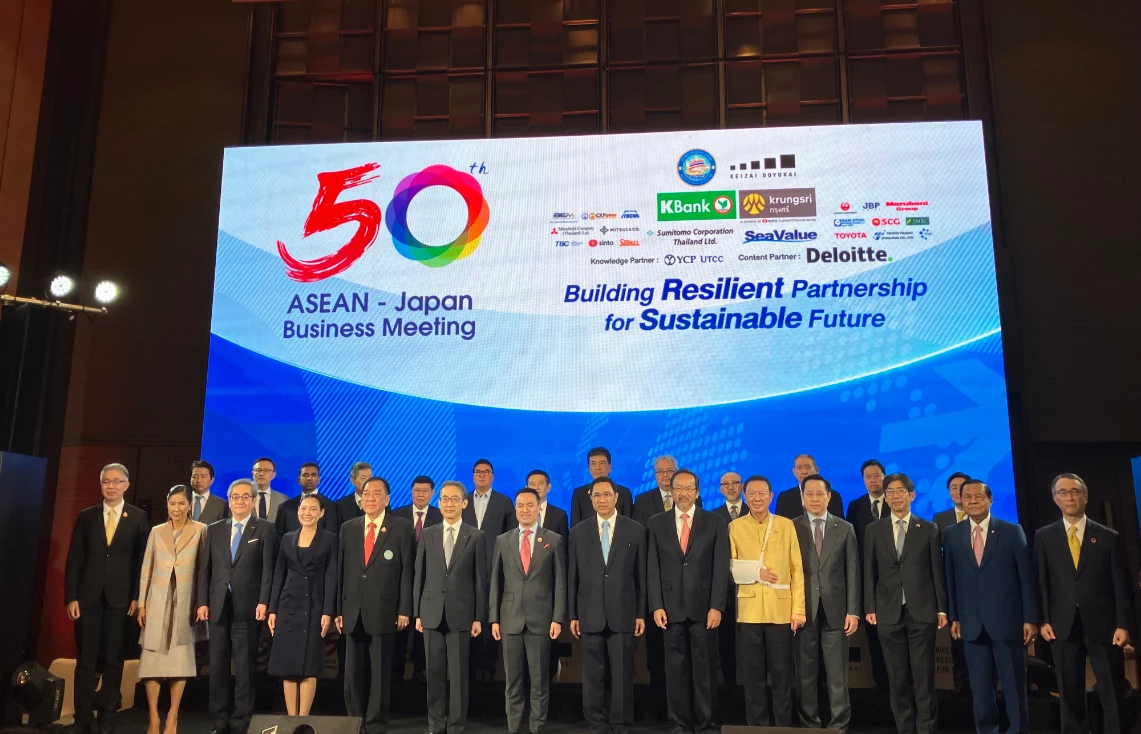Bangkok, Thailand, November 7, 2024—Mr. Kalin Sarasin, Honorary Chairman of the Thai Chamber of Commerce and the Board of Trade of Thailand, announced today the opening of the 50th ASEAN-Japan Business Meeting (AJBM) at The Okura Prestige Bangkok Hotel. Co-hosted with Keizai Doyukai (Japan Association of Corporate Executives), the event focuses on ASEAN-Japan cooperation and gathers key business leaders, policymakers, and stakeholders to discuss critical issues under the theme, “Building Resilient Partnerships for Sustainable Futures.” With support from Thailand’s Minister of Industry, H.E. Mr. Akanat Promphan, discussions focused on reinforcing cross-sector partnerships to tackle regional challenges.
The forum highlighted four priorities:
- Food Security: To strengthen resilience, the forum advocated for sustainable practices in ASEAN’s agri-food sector, emphasizing protein diversification, climate-resilient crops, and robust supply chains.
- Sustainable Tourism: Recognizing tourism's regional impact, discussions focused on promoting ESG principles, community-based tourism, and fair wage policies to ensure benefits are equitably distributed and resources protected.
- Mobility: Addressing urbanization challenges, the AJBM explored sustainable transportation, such as electric vehicles and smart traffic systems, including Bangkok’s adaptive traffic control in collaboration with JICA.
- Human Resources: With a new HR platform to boost cross-border mobility, the AJBM aims to meet industry needs by connecting ASEAN and Japan’s workforce with essential training and job pathways.
The event reinforced ASEAN and Japan’s commitment to sustainable growth and deeper collaboration. The success of the meeting highlighted the strength of their partnership, particularly through the creation of a white paper compiling key conclusions and recommendations. This document will be presented to the governments of all AJBM member countries, offering valuable insights to support the economic development of both ASEAN and Japan and further strengthen their ties.
Mr. Yuji Hirako, Co-Chairperson of the Japan-Asia Relations Committee at Keizai Doyukai and Senior Advisor at ANA Holdings Inc., underscored Keizai Doyukai’s commitment to fostering meaningful outcomes through collaborative, forward-thinking initiatives. He emphasized the meeting’s theme as a reflection of ASEAN and Japan’s potential to set a global example for regional cooperation, with this milestone serving as a platform to strengthen cross-border partnerships built on shared values and mutual interests. As part of Keizai Doyukai's dedication to regional prosperity, the Human Resource (HR) Platform initiative will be unveiled as a significant component of this year’s discussions. This innovative platform addresses the talent mobility and skill enhancement challenges facing both ASEAN and Japan, connecting individuals to essential training, resources, and employment in emerging industries. Keizai Doyukai sees this endeavor as a vital step toward cultivating a more agile and globally competitive workforce that can thrive amid a rapidly evolving economic landscape.
Mr. Seiji Imai, Co-Chairperson, Japan-Asia Relations Committee, Keizai Doyukai and Chairman, Member of the Board of Directors, Mizuho Financial Group, added that the HR Platform initiative is currently in its preparatory stages, with key brainstorming sessions involving ERIA and Keizai Doyukai’s Asia Committee to establish a clear, impactful framework. This initiative has engaged prominent Japanese companies, such as Sompo Holdings, Suntory, and ANA Holdings, and will soon invite a broader network of stakeholders across ASEAN and Japan to collaborate. By focusing on topics such as legal frameworks to facilitate cross-border talent mobility, the platform aims to address the long-standing need for interconnected talent development programs that lead to meaningful employment opportunities. This initiative provides real-world economic benefits by supporting companies facing labor shortages and fostering inclusivity. Ultimately, the HR Platform and AJBM’s broader discussions aim to create a sustainable, integrated ASEAN, building on shared goals and enhancing opportunities for talent and economic growth across the region.
Mr. Yuki Ishida, Director and Group CEO of YCP Holdings, emphasized that the AJBM will be a crucial platform for business leaders and policymakers to exchange insights, build partnerships, and lay down collaborative frameworks that benefit both ASEAN and Japan. The outcomes of the discussions will be compiled into a comprehensive white paper, summarizing actionable solutions and insights across key sectors. This white paper will include specific recommendations to reinforce ASEAN-Japan cooperation in advancing economic resilience and sustainable futures.
The white paper will address topics in food security by outlining a framework for sustainable agricultural practices, promoting climate-resilient crop varieties, and fostering public-private partnerships to safeguard the ASEAN agri-food sector against environmental and geopolitical pressures. In the area of mobility, it will emphasize cross-sector coordination and the use of smart technologies to mitigate urban congestion, enhance public health, and support economic productivity. For tourism, the white paper will stress strategies for sustainable growth, including the promotion of alternative destinations and eco-friendly practices that distribute tourism’s economic benefits more equitably.
Assoc. Prof. Dr. Thanavath Phonvichai, President of University of the Thai Chamber of Commerce share that AJBM concludes with targeted recommendations to reinforce ASEAN-Japan cooperation:
- Promote Multi-Sectoral Collaboration: The AJBM calls for enhanced public-private partnerships to address regional challenges comprehensively. By pooling resources, expertise, and funding across sectors, these collaborations can drive sustainable development in infrastructure, clean energy, and public transit, bridging resource gaps and enabling impactful progress across ASEAN.
- Invest in Resilient Technologies: Recognizing technology as essential for a sustainable future, the AJBM urges investment in precision agriculture, AI-driven traffic management, and renewable energy. Supporting climate-resilient crops and sustainable energy will help ASEAN and Japan mitigate environmental challenges and enhance quality of life.
- Expand Sustainable Practices and Eco-Friendly Standards: AJBM advocates adopting green standards across industries, from eco-certification for hotels to waste reduction initiatives and low-emission zones. These measures will reduce environmental impact and position ASEAN and Japan as leaders in global sustainability.
In closing, Mr. Kalin Sarasin emphasized the 50th ASEAN-Japan Business Meeting as a milestone in ASEAN-Japan economic cooperation. “In facing shared challenges, this gathering reaffirms our commitment to sustainability and resilience,” he noted. The outcomes of this AJBM will guide ASEAN and Japan toward innovative, sustainable solutions for mutual prosperity. With continued collaboration and investment in innovation, ASEAN and Japan can secure a resilient future that benefits both regions and the global community.
Source image: x.com @KeizaiDoyukai





